
AI & Society
Scope & Guideline
Bridging the Gap Between AI and Ethical Inquiry
Introduction
Aims and Scopes
- Interdisciplinary Research:
The journal encourages contributions from various disciplines such as sociology, philosophy, law, and computer science, aiming to bridge gaps between technical and social understandings of AI. - Ethics and Governance:
A core focus is on ethical considerations and governance frameworks for AI technologies, exploring how to ensure fair, transparent, and accountable AI systems. - Cultural Impact of AI:
The journal investigates the cultural implications of AI, including how AI influences creativity, identity, and societal norms, and how these technologies are represented in media and art. - Social Justice and Equity:
It emphasizes the need for equitable AI solutions, addressing issues like bias, discrimination, and the digital divide, and advocating for inclusivity in AI development and deployment. - Future Societal Scenarios:
The journal explores speculative futures shaped by AI, considering potential social transformations and the philosophical implications of living alongside intelligent systems.
Trending and Emerging
- AI Ethics and Accountability:
There is a growing emphasis on accountability in AI systems, with discussions around ethical frameworks and practices that ensure responsible AI development and deployment. - Societal Impacts of Generative AI:
Research focusing on generative AI technologies, including their implications for creativity, authorship, and social interaction, is gaining momentum as these technologies become more prevalent. - AI in Governance and Policy:
Increasing attention is being given to how AI can be integrated into governance frameworks, addressing issues of transparency, citizen engagement, and democratic participation. - Mental Health and AI:
The intersection of AI and mental health is emerging as a significant theme, exploring how AI tools can support mental health initiatives, therapy, and patient autonomy. - AI and Climate Change:
There is a rising interest in examining how AI can be leveraged to address climate change challenges, reflecting the urgency of environmental concerns and the role of technology in sustainability.
Declining or Waning
- Technological Determinism:
There seems to be a waning interest in strictly deterministic perspectives on technology, as more nuanced discussions about the interplay between technology and social structures gain traction. - Overly Technical Analyses:
Papers that focus solely on technical aspects of AI without considering their societal implications are becoming less frequent, indicating a shift towards more holistic and interdisciplinary approaches. - AI and Traditional Employment:
Research specifically centered on the impact of AI on traditional employment roles is declining, possibly due to the increasing recognition of AI's broader societal impacts beyond job displacement. - Narrow AI Applications:
There is a noticeable decrease in studies focused solely on narrow AI applications without a critical analysis of their societal context, reflecting a preference for discussions that encompass wider implications. - Historical Perspectives on AI:
Research that primarily examines historical developments of AI technologies without connecting them to current societal challenges appears to be diminishing, as contemporary issues take precedence.
Similar Journals
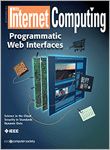
IEEE INTERNET COMPUTING
Charting the Course for Future ConnectivityIEEE Internet Computing is a prominent journal in the field of computer networks and communications, published by the esteemed IEEE Computer Society. With an impressive impact factor and ranking in the Q1 category for 2023, it stands out as a vital resource for researchers, professionals, and students alike, seeking to delve into the latest advancements and trends in internet computing. Since its inception in 1997, the journal has provided a platform for pioneering studies and insightful discussions that bridge theory and practice in the rapidly evolving digital landscape. The journal is indexed with an excellent Scopus rank of #77 out of 395, placing it in the 80th percentile of its category, which underlines its relevance and influence in the academic community. While it currently does not offer Open Access options, its rich archive of scholarly articles remains accessible to those affiliated with research institutions and libraries. Furthermore, the journal's comprehensive coverage continues through 2024, ensuring it remains at the forefront of the discipline.
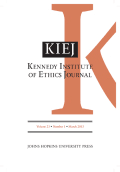
KENNEDY INSTITUTE OF ETHICS JOURNAL
Illuminating Ethical Challenges in Health and HistoryThe KENNEDY INSTITUTE OF ETHICS JOURNAL, published by the prestigious Johns Hopkins University Press, stands as a leading periodical in the realm of ethics, particularly emphasizing the intersection of health policy, social sciences, history, and philosophy of science. With an ISSN of 1054-6863 and an E-ISSN of 1086-3249, this journal has been a cornerstone of ethical discourse since its inception in 1991. Renowned for its rigorous peer-review process, the journal boasts impressive rankings, including Q1 in History and Philosophy of Science and Q2 in Health (Social Science) for 2023. Researchers, professionals, and students alike will find this journal invaluable for navigating complex ethical issues, providing a platform for innovative research and discourse. Although currently not offering Open Access, its contributions to the fields of ethics and legal aspects of health are profound, making it an essential resource for those engaged in these critical discussions.
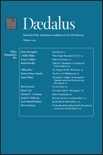
DAEDALUS
Unraveling Complexities of Culture and SocietyDAEDALUS, published by MIT Press, stands as a premier journal at the intersection of social sciences, humanities, and philosophy, serving as a vital platform for interdisciplinary dialogue since its inception in 1965. With an outstanding reputation, reflected in its Q1 rankings across various categories—including Arts and Humanities, Political Science, and History and Philosophy of Science—it is recognized for its rigorous scholarship and insights. DAEDALUS is particularly valued for its contributions to understanding complex social phenomena and cultural dialogues, making it essential reading for researchers, academics, and students alike. Although not currently offering Open Access, the journal maintains a high impact factor and ranks within the top echelons of academic publishing, with Scopus rankings that place it among the best in its fields. By exploring the intricacies of human society and thought, DAEDALUS invites submissions that engage with contemporary issues, fostering innovative solutions and thought-provoking discussions.
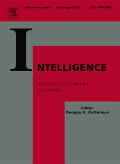
INTELLIGENCE
Charting New Territories in Human Thought and DevelopmentINTELLIGENCE, published by Elsevier Science Inc, is a leading international journal dedicated to advancing research in the fields of cognitive psychology, developmental psychology, and human intelligence. With an impact factor reflecting its authority within the academic community, this journal occupies a prestigious position—ranking in the Q1 category for Arts and Humanities and achieving strong Q2 rankings in both Developmental and Educational Psychology and Experimental and Cognitive Psychology. Scholars can access high-quality research articles that contribute to the understanding of intelligent behavior, cognitive processes, and the implications of intelligence in various contexts. By encompassing a broad range of interdisciplinary perspectives since its inception in 1977 and continuing into 2024, INTELLIGENCE serves as an essential resource for researchers, professionals, and students keen to explore the complexities of human thought and learning.
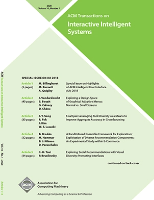
ACM Transactions on Interactive Intelligent Systems
Innovating Tomorrow's Interactive Intelligent Systems Today.ACM Transactions on Interactive Intelligent Systems is a distinguished journal published by the Association for Computing Machinery (ACM), specializing in the realms of Artificial Intelligence and Human-Computer Interaction. With an impactful presence in the academic community, it boasts a respectable Q2 quartile ranking in both fields as of 2023, highlighting its significant contributions to advancing interactive intelligent systems. The journal, identified by ISSN 2160-6455 and E-ISSN 2160-6463, encompasses a broad spectrum of research from theoretical advancements to practical implementations, offering invaluable insights for researchers, professionals, and students. The journal not only serves as a platform for innovative ideas and methodologies but also emphasizes the importance of interdisciplinary approaches in its publications. Positioned in the United States, at 1601 Broadway, 10th Floor, NEW YORK, NY 10019-7434, it stands out for its commitment to quality, rigor, and relevance within the computing and interactive systems sectors.
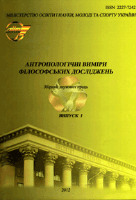
Anthropological Measurements of Philosophical Research
Exploring the Intersection of Humanity and ThoughtAnthropological Measurements of Philosophical Research is a distinguished open-access journal published by the ACAD V LAZARYAN DNIPROPETROVSK NATL RAILWAY TRANSPORT UNIV, dedicated to advancing interdisciplinary scholarship at the intersection of anthropology and philosophy. Since its inception in 2012, this journal has provided an invaluable platform for researchers, professionals, and students to disseminate innovative ideas and research findings, thereby fostering a deeper understanding of anthropological principles applied to philosophical inquiries. The journal encourages submissions that explore theoretical frameworks, longitudinal studies, and methodological advancements within this complex field. With a commitment to accessibility, it operates under an open access model, facilitating wider dissemination and engagement with its content. Situated in Dnipro, Ukraine, this journal aspires to contribute significantly to global discourses on cultural and philosophical dimensions of human experience, making it essential reading for anyone interested in these critical areas of study. Scholars focused on developing multidisciplinary approaches will find Anthropological Measurements of Philosophical Research an indispensable resource in their academic pursuits.

Ethics and Information Technology
Bridging Technology and Morality for a Better TomorrowEthics and Information Technology, published by Springer, stands as a pivotal journal in the interdisciplinary field that bridges technology with ethical considerations. With an ISSN of 1388-1957 and an E-ISSN of 1572-8439, this journal serves as a key resource for scholars exploring the complex dynamics between information technology and ethical implications, helping to shape the discourse around privacy, cybersecurity, and digital governance. Ranking in the top quartile of both Computer Science Applications and Library and Information Sciences, the journal has attained impressive Scopus rankings, placing it at #25 out of 280 in Social Sciences and #156 out of 817 in Computer Science. This high standing reflects its significant impact and relevance in contemporary research, as well as its invaluable contribution towards fostering a responsible use of technology. Researchers, professionals, and students can benefit from its comprehensive studies and cutting-edge findings, making it a crucial platform for advancing knowledge in this essential area of study. The journal has been continuously published since 1999, with content converging through to 2024, ensuring that it remains up-to-date with the rapid advancements in technology and ethics.

Eptic
Championing Open Access for Global Impact.Eptic is a prominent open-access journal published by the Universidade Federal de Sergipe, dedicated to advancing the fields of science and technology. Since its inception in 1999, Eptic has provided a platform for researchers, academics, and professionals to disseminate their findings, fostering a collaborative environment that encourages innovation and knowledge sharing within the scientific community. While the journal currently holds an ISSN of 1518-2487 and an E-ISSN of 1518-2487, its commitment to open access ensures that all published articles are freely available to a global audience, empowering students and researchers alike to contribute to and engage with cutting-edge research. The journal's impact within its field, although not quantitatively ranked in HIndex or Scopus, is evident in its dedication to quality and accessibility, making it a vital resource for those seeking to explore new ideas and developments in science and technology.

AI MAGAZINE
Connecting Researchers and Practitioners in AI.AI MAGAZINE, published by the American Association for Artificial Intelligence, serves as a pivotal resource in the field of artificial intelligence. With an established history since 1984 and convergence periods highlighting its adaptability, the journal remains integral for sharing significant advancements and research findings. Housed in the United States, it provides a comprehensive platform for professionals, researchers, and students alike, delving into topics such as machine learning, natural language processing, and intelligent systems. Despite its current Q3 ranking in the Artificial Intelligence category, AI MAGAZINE sustains a significant impact through its diverse range of articles aimed at bridging the gap between theory and application. Although it is not an open-access journal, it continues to nurture a vibrant academic community, encouraging the exchange of knowledge and innovation in this rapidly evolving domain.
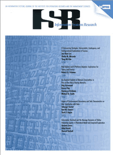
INFORMATION SYSTEMS RESEARCH
Shaping the future of decision sciences with cutting-edge research.INFORMATION SYSTEMS RESEARCH, published by INFORMS, stands as a pivotal academic journal in the field of information systems and management. With a robust impact factor and consistently achieving Q1 quartile rankings across multiple categories—including Computer Networks and Communications, Information Systems, and Library and Information Sciences—it has established itself as a leading forum for innovative research and practical insights. The journal has been converging scholarly work since 1990, offering a rich repository for researchers, professionals, and students interested in the intersection of decision sciences and technology. While it operates under standard access options, its significant contributions to the field ensure that it remains a critical resource for advancing knowledge and fostering professional growth. Situated in the United States, INFORMATION SYSTEMS RESEARCH not only comprehensively addresses contemporary challenges in the domain but also influences best practices and strategic decision-making across various industries.